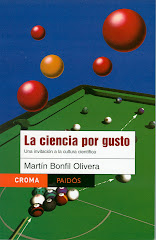by Martín Bonfil Olivera
Published on Milenio Diario, January 14, 2009
 Excess is usually bad, in science or in any other area. An example is the polemic essay (not scientific article) that biologist Larry Young published recently in Nature magazine (and that was reviewed in MILENIO Diario).
Excess is usually bad, in science or in any other area. An example is the polemic essay (not scientific article) that biologist Larry Young published recently in Nature magazine (and that was reviewed in MILENIO Diario).
My colleagues Horacio Salazar and Braulio Peralta have already commented on this: Horacio thinks that "it is marvelous to imagine that the elegance of biochemistry is behind that vital motor", while Braulio thinks its "questionable".
Young proposes, using a very reasonable evolutionist logic, that the neuro-hormonal mechanisms that must underlie that complex and diverse human phenomenon called love (because we know that mind and emotions are products of the brain, not a spirit: if not, Alzheimer's disease wouldn’t cause the harm it does) must have evolved through already existing mechanisms in our mammal ancestors.
He postulates that the mechanisms by which the hormones oxytocin, in females, and vasopressin , in males, contribute to establish the bonds between parents and breed could have been adapted in the course of human evolution to form bonds between couples.
Up to this sentence, we are fine, although his conjectures regarding the possibility of future genetic love compatibility tests or drugs to facilitate attraction can be disturbing (he mentions them because, if he is right, we might have to make some decisions soon, as a society, about these issues).
What might be questioned is Young's reductionist vision. Its true that all mental or emotional states must have some neurological and, ultimately, chemical basis. But this does not mean love is "just chemistry". This is "dumb reductionism", because it is excessive. Phenomena like mind and conscience are no less real —and no less complex, far beyond mere chemistry or brains— just because their basis can be reduced to these elements. That would be like saying that TV series are "only electricity".
Reductionism is not a sin, if it works as a path to knowledge. But reducing love to "just chemistry" amounts to commmiting the sin of ambitious reductionism.
(translated by Adrián Robles Benavides)
To receive Science for pleasure weekly
in your email, subscribe here!





No comments:
Post a Comment